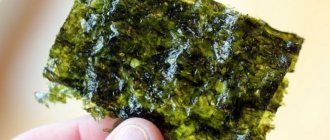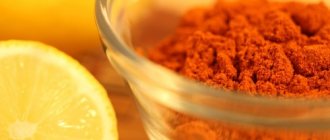How the supplement is made
- The substance is extracted from fish that live in cold sea water: cod, mackerel, herring and others.
- Lipid accumulation occurs in the liver, which helps the fish maintain hormonal balance and provides thermal protection.
- There are white, red and yellow types of the substance. White is the most beneficial for humans; it is formed by steaming the liver at a temperature of 50 degrees.
Selection and storage
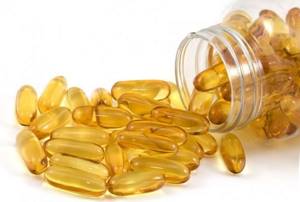
When purchasing fish oil, you need to pay attention to what it is made from. It is better to give preference to oil squeezed from fish meat. The label or instructions for use must be marked “medical”. When purchasing a product in liquid form, it is better to have it in a dark glass container. It is important to pay attention to the production date. The shelf life of fish oil is 2 years if storage conditions are met.
Today, quite a few pharmaceutical companies produce fish oil; it is difficult to choose one of them. Norwegian manufacturers of this product have proven themselves well. In Russia, fish oil produced in Arkhangelsk and Murmansk is in good demand.
What does fish oil consist of?
The nutritional value of fish oil is determined by the complete uniqueness of its composition. The additive consists of a mixture of esters consisting of glycerin and beneficial acids. Components included:
- Omega 3. This is exactly the substance with which the description should begin. This is a unique component, the benefits of which are difficult to overestimate. Fish oil and Omega 3 are inseparable. Many patients are prescribed the use of this supplement precisely because of this component.
- Acids: oleic, palmitic, arachidonic and many others. They serve as auxiliary components to accelerate the absorption of the main ones.
- Vitamins of group A. Excellent for hair and all internal organs. Often, replenishing the missing amount of vitamin A is enough to solve the problem of dry skin and acne.
- Vitamin D. Strengthens the skeleton and helps prevent rickets in children. This type of vitamin is synthesized under the influence of the sun and is difficult to find in sufficient quantities in dishes.

Different Forms of Omega-3 Supplements
Due to the specific nature of the raw materials, such dietary supplements cannot be made in the form of solid tablets. Therefore, companies produce fish oil in two formats:
- liquid emulsion;
- capsules.
Both emulsion and capsules have their advantages and disadvantages.
Emulsion
It is usually bottled in small tinted glass bottles to prevent the product from heating up in the sun. As a result, it quickly goes rancid and becomes unfit for consumption.
Pros:
- Each bottle contains a convenient pipette with which you can measure the required amount of liquid;
- suitable for both adults and children;
- sometimes flavorings are added to improve the taste of the product;
- Fish oil is often fortified with vitamin D.
Minuses:
- if there are no flavorings, the taste and smell of the liquid is very specific and not pleasant to everyone.
Capsules
The soft tablet shell consists of gelatin. It quickly dissolves in the stomach and releases its liquid contents. It is better to choose a drug whose shell is made of fish gelatin. For those who find fish burps unpleasant, soft tablets are made with a special coating that bursts in the intestines. Fish oil capsules contain the purest Omega-3, which is perfectly absorbed and helps lower the level of “bad” cholesterol.
Pros:
- the taste of fish is not felt;
- convenient to take;
- the dosage is already calculated by the manufacturer;
- greater efficiency compared to emulsions;
- Vitamins are often added to fish oil capsules.
Minuses:
- should not be given to small children;
- Often the capsules are too large and difficult to swallow.
Microelements included
Microelements are presented in a large number of options:
- iron ions - help transport oxygen in the blood;
- calcium - participates in all important processes;
- Iodine ions - strengthen the immune system, stimulate the production of thyroid hormones;
- magnesium - maintaining ionic balance;
- manganese is a component of organs and tissues, the deficiency of which causes sexual impotence and osteosclerosis;
- chlorine ions - help form hydrochloric acid;
- Bromine ions are the main substance that determines the functioning of the central nervous system.

Macroelements and minerals are needed by the human body every day. Their quantity and concentration in fish oil completely determines its healing properties. In addition, it contains components that are difficult to find in any other product.
Contraindications
Several years have passed that are far from the best for fish oil. The claims have been overshadowed by the fact that the long-chain omega-3s in fish oil, EPA/DHA, have the potential to stop the progression of heart disease. DHA was then found to be associated with an increased risk of prostate cancer and a complete failure to treat macular degeneration. ()
This out-of-bounds reasoning sounds a little suspicious. Indeed, the article was retracted because the author was selling certain competing supplements that he did not disclose. However, in some ways he is still right.
Research on the connection between fish oil and cancer
Men with the highest levels of the long-chain omega-3 fat DHA in their blood have been found to have a higher risk of developing prostate cancer. ()
However, the subsequent accumulation of data from all such studies suggests that EPA—another long-chain omega-3 fatty acid found in fish and fish oil—may be closely linked to an increased risk of cancer. ()
However, these long-chain omega-3 fatty acids have been promoted as a means of preventing heart disease and cancer. ()
However, we now know that these supplements not only help prevent heart attack or stroke, but may also increase the risk of cancer. Thus, general recommendations to increase consumption of these fats must also take into account the potential risks.
How might consuming more fish or fish oil increase your risk of cancer?
Some industrial pollutants, such as PCBs, have been linked to an increased risk of prostate cancer, and “the main source of exposure in the general population is thought to be diets containing fish, meat and dairy products.” ()
If you do research in any supermarket, you will see that the highest concentration of PCBs is in freshwater fish, and the lowest in animal products. A study of vegans found that compared to omnivores, their bodies were significantly less contaminated with prostate cancer-linked PCBs. ()
However, the prostate cancer study was conducted in North America, where people tend to eat little fish. ()
Indeed, the group with the highest DHA levels did not perform as well. So it may be that consumption of meat in general, rather than just fish, was a confounding factor. Reduced meat consumption may be responsible for lower rates of prostate cancer in the low DHA group, while consumption of well-cooked meat is associated with an increased risk of prostate cancer. Therefore, its consumption should be limited. ()
We also tend to think that omega-3 protects us from arrhythmias - abnormal heart rhythms, such as atrial fibrillation. Millions of people suffer from this condition, which causes an irregular heartbeat and increases the risk of stroke and death. However, consumption of fish or fish oil does not appear to be effective in preventing or treating this disease. ()
Other types of arrhythmia can be life-threatening and cause sudden death. Initial results were encouraging. However, more recent studies have shown that omega-3 supplementation not only does not reduce the risk of sudden cardiac death, but is also detrimental to the health of patients with heart disease. ()
For example, men with heart disease who were advised to eat more fatty fish or take fish oil capsules were found to have a higher risk of cardiac death. This may be due to contaminants such as mercury in the fish. In any case, given the conflicting benefits and potential side effects, omega-3s should be used with extreme caution. In addition, general recommendations to increase consumption of fish and fish oil capsules need to be reconsidered.
Caloric content of fish substance
The drug is the leader in calorie content. The calorie content of 100 g is about 903 kcal, and 99% is fat. This fact is not so important, since the product is not consumed in large quantities. Its energy value has unique properties, because in the case of the substance in question, fats are healthy.
The glycemic index of fish products is approaching zero. The same indicator applies to fish, red caviar and other seafood delicacies.
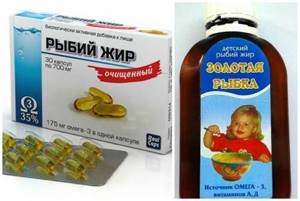
The benefits of fish delicacy
Analyzing what the benefits and harms of this product are, first of all we will list all types of positive effects.
- Stimulating brain function. This is exactly the remedy that doctors recommend to prevent age-related health problems and Altsheimer's disease, as a component of treatment for multiple sclerosis.
- Prescribed as an assistant in replenishing the loss of useful elements during anemia.
- Stimulating weight loss. It would seem that with such a high calorie content, the product should have the opposite effect, but in fact this is not the case. It helps normalize metabolic processes, which has a positive effect on excess weight loss.
- Rapid healing of wounds, burns and other skin injuries.
- Elimination of vitamin D deficiency - the root cause of rickets.
- It will help get rid of the problem of hair loss, and you can use it both internally and using masks.
- Improving the quality of bones and teeth. The benefits to human health in this situation are invaluable.
- Doctors say that those who use the supplement are more protected from cancer.
- If you have hepatitis C, you should also use the product; it will not help cure the disease, but will significantly strengthen the immune system.
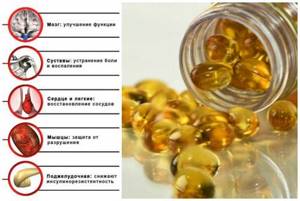
As a result, it turns out that fat will strengthen the skeletal system, supply it with vitamins, and help overcome numerous ailments.
Lack of polyunsaturated acids in the body
A deficiency in the body of omega-3 can be either partial (caused by poor diet or disruption of the gastrointestinal tract) or complete. With a partial deficiency of fatty acids in the body, the functioning of internal organs and systems suffers. A complete deficiency greatly affects the immune system, but it should be noted that this phenomenon is quite rare.
Early symptoms of a lack of fatty acids are dry skin and allergic reactions. Then muscle weakness occurs, physical and brain activity decreases, and vision suffers. Hair becomes brittle and then begins to fall out. A lack of omega-3 provokes the development of depression and increased blood pressure.
Benefits for men
For courageous representatives of the stronger sex, it is worth taking 15 ml of the substance due to the following properties:
- Will help you achieve high results in sports. This happens because it strengthens muscles, bones and joints. This minimizes injury and improves performance.
- The use of the beneficial substance is also common in bodybuilding. Many healthy fats are absorbed by the body and are not stored in the sides.
- Improves heart function, reduces the risk of heart attacks.
- Normalization of the production of male sex hormones.
Restrictions
In short: do not consume fish oil on an empty stomach, as this can lead to unpleasant sensations and discomfort.
At the end of the 80s of the last century, fish oil was banned in the USSR due to the content of heavy metals that accumulated in the liver of the fish and were transferred to omega-3 capsules.
The formation of the new purification process took almost 20 years. Currently, the risk of the presence of heavy metals in dietary supplements has been reduced to a minimum. Triple purification has become the standard in the production of fish oil, during which the presence of heavy metals in the final product becomes impossible.
You should avoid using the substance if you have an individual intolerance or allergy to seafood in food. Remember that the effectiveness of omega-3 is reduced in diseases of the gastrointestinal tract.
A study conducted on 72 mice indicated the effect of fish oil on fatty liver disease in some mice. Other studies do not confirm this result, but patients in the early stages of fatty liver disease should avoid the supplement.
This supplement is not recommended for people with slow blood clotting.
What are the benefits for women?
The benefits for women are as follows:
- the quality of hair, skin and nails improves;
- hypertension is often transmitted through the female line, and fish oil fights it perfectly;
- normalization of weight, assistance in losing weight;
- Omega 3 is indispensable for a woman’s body.
Important! It is better to take it in courses. Their frequency and duration must be agreed with your doctor.
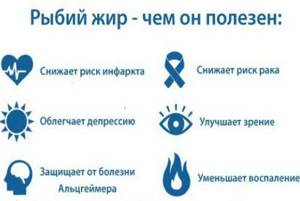
Dosages and precautions

Fish oil, as is already clear, is a useful component of the diet. However, excessive use of it can cause adverse consequences.
Overdose symptoms:
- fever and chills;
- increased heart rate;
- skin rash;
- stomach upsets;
- unpleasant taste and dry mouth;
- belching;
- liver and kidney damage.
The optimal daily intake for healthy adults is considered to be 1000 mg of the substance. It is important to consult a physician before taking it as a dietary supplement.
Although concentrated dietary supplements are far from the only way to replenish fatty acids in the body. It is much more useful to include fish in your traditional menu, preferably sea fish. However, this is not without dangers - some varieties of marine life may contain mercury, which they absorbed from the water. Therefore, it is so important to know where the fish that came to your table was caught.
Benefits for children
For the child's body, the effect is as follows:
- replenishment of vitamin D during the period of active skeletal growth;
- assistance to the proper development of teeth;
- improved vision, reduced hyperactivity and fatigue;
- excellent effect on joint development.
It turns out that the cloudy substance is prescribed to the child for absolutely good reason: it helps the formation of the skeleton and healthy growth.
Interesting! Children do not like this product, so it is better to give the child the medicine in capsules.
Harm from consumption
Fish oil can be harmful to the human body if there are the following problems in the body:
- Excess vitamin D. This is dangerous because it is not excreted from the body in full and settles in the liver.
- Excess vitamin A is dangerous for the same reason.
- Allergic reactions to fish products.
- The supplement should not be taken from infancy.
- Exacerbation of chronic diseases.
- Disruption of the thyroid gland and hormonal system.
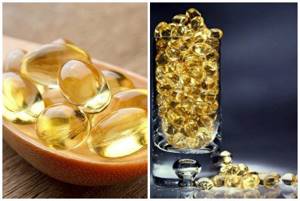
Important! Treat the supplement like you would a medicine and discuss taking it with your local doctor.
Nutritional value
All types of fish oil contain a certain amount of polyunsaturated fatty acids.
However, oil obtained from cod or shark liver contains significantly more vitamins A and D. Fermented cod liver oil is even healthier, since it already contains vitamin K2, which is deficient in the majority of the world's population. By the way, it is this vitamin that is responsible for proper blood clotting, the health of the heart, blood vessels, skin, bones, and also supports the body’s ability to grow and prevents the formation of malignant tumors. Nutritional components per 100 g of product
| Calorie content | 902 kcal |
| Carbohydrates | 0 g |
| Squirrels | 0 g |
| Fats | 100 g |
| Cholesterol | 570 mg |
| Saturated fats | 22.1 g |
| Monounsaturated fats | 46.7 g |
| Polyunsaturated fats | 22.5 g |
| Vitamin A | 10000 IU |
| Vitamin D | 250 mcg |
Daily consumption rate
The dosage depends on the age of the person:
- up to 3 years - 7 ml.;
- from 3 to 7-10 ml.;
- 7-12 years - 13 ml.;
- from 13 years old - 15 ml.

We can conclude that fish product is a unique supplement that is given to humans by nature. He is extremely helpful and very accessible. The only negative is the unpleasant smell and taste, but these little things are incomparable to the enormous benefits it brings to everyone.
Instructions for use
Time required: 5 minutes.
A step-by-step guide to the proper use of fish oil supplements.
- Determine the correct dosage
Examine the packaging of the dietary supplement. Look for directions on the correct dosage.If the dosage is not indicated, you will need 0.2 - 0.5 g of EPA and DHA, which should be indicated.
Typically, you will need to drink 1 to 3 fish oil capsules per day.
- Plan your meals
Fish oil should be taken after eating. This way you can increase the effectiveness of the dietary supplement and also reduce the likelihood of side effects. - Check the integrity of the packaging and capsules
Before using the dietary supplement, you should make sure that the packaging has not been damaged and that the capsules have been stored under proper conditions.Smell the supplement; if you smell a strong odor, you should stop using the supplement.
It is also unsafe to take fish oil capsules that feel hot in the mouth.
- Take the supplement
Drink fish oil capsules generously as you swallow.
If you don't eat 1-2 servings of oily fish per week, then fish oil is the way to go.
If you experience an unpleasant aftertaste when taking the supplement, take the capsules with food or freeze them in the refrigerator before taking.
Fish oil can oxidize if you leave it in direct sunlight. Before using “melted” capsules, they must be frozen.
The duration of the course can last up to 3 months. It is not necessary to take breaks from taking capsules. The supplement is sold in pharmacies without a doctor's prescription.
Store in a dry, dark place at room temperature. Shelf life: 3 years.
| Compound | Per serving | % of daily value |
| Calories | 10 | |
| Fats | 1 g | 2% |
| Cholesterol | 5 mg | 2% |
| Fish fat | 1000 mg | 100% |
| Omega-3 fatty acids | 300 mg | 100% |
| Eicosapentaenoic acid | to 10% | |
| Docosahexaenoic acid | up to 15% | |
| Oleic acid | up to 70% | |
| Palmitic acid | up to 25% | |
| Linoleic acid | 2% | |
| Arachidonic acid | 2% | |
| Stearic acid | 1-2% | |
| Acetic acid | 0,3% | |
| Butyric acid | 0,3% | |
| Valeric acid | 0,3% | |
| Capric acid | 0,3% | |
| Lipochrome | ||
| Iodine | 0,002% | |
| Bromine | up to 0.02% | |
| Phosphorus | up to 0.02% | |
| Sulfur | up to 0.02% | |
| Morruin, Azellin, Ptomain | 0,2% | |
| Ammonia, trimethylamine, butylamine | ||
| Vitamin A | ||
| Vitamin D |
Dosage (daily rate)
Dosage recommendations vary by age and health.
WHO recommends taking 0.2-0.5 g of combined EPA and DHA daily.
Choose a fish oil supplement that provides at least 0.3 grams (300 mg) of EPA and DHA per serving.
The standard dosage of capsules is 1000 mg. These capsules are taken 1 piece per day after meals. It is recommended to take capsules 30 minutes after meals with warm water. During the treatment period, you can take up to 3 capsules per day (morning, afternoon and evening).
For children under 18 months, the calculation is based on 60 mg per kilogram of weight. For children from 1.5 to 15 years old, the portion is halved to 30 mg. Adult men require 2 grams. for every kilogram, and for women 1.6 grams. The minimum consumption dose is 0.25 g, and the maximum is 8 g.
Form
Fish oil supplements come in several forms, including ethyl esters, triglycerides, reformed triglycerides, free fatty acids, and phospholipids.
Ethyl esters are less easily absorbed by the body, so they are best avoided.
Concentration
Many supplements contain up to 1000 mg of fish oil per serving, but only 300 mg of EPA and DHA. Read the product label and choose a supplement that contains at least 500 mg of EPA and DHA per 1,000 mg of fish oil.
Purity
Fish oil may not contain what it says on the label. Therefore, choose a supplement that has been “third-party tested” or has a GOED standard of purity.
Freshness
Omega-3 fatty acids are susceptible to oxidation, which makes them rancid. To avoid this, you can choose a supplement that contains an antioxidant such as vitamin E.
Also, keep your supplements away from light, ideally in the refrigerator. Do not use a fish oil supplement that smells rancid or has expired.
Time of receipt
Other fats in your diet help with the absorption of omega-3 fatty acids. Thus, it is better to take fish oil with fatty foods.
During pregnancy
Fish oil improves health during pregnancy and lactation. It promotes the development of the nervous system, relieves inflammation, improves heart function and reduces the likelihood of premature birth.
For the fetus, unsaturated fatty acids affect the formation of the nervous system and the development of vision. During breastfeeding (lactation), it promotes milk production and reduces the likelihood of depression.
Fatty acids are essential for early growth and development. Therefore, it is important that mothers get enough omega-3s during pregnancy and while breastfeeding.
Taking fish oil by pregnant and breastfeeding mothers may improve hand-eye coordination in infants and also reduce the risk of allergies.
Find out more
Drug compatibility
Consumption of retinol (vitamin A) and vitamin D reduces the effectiveness of the supplement.
Pairs great with:
- Vitamin E, Milk thistle - because they reduce lipid oxidation;
- Curcumin - it reduces the risk of breast cancer in women;
- Fucoxanthin - the effect of the substance is enhanced by omega-3;
- Fenugreek oil - it reduces glucose fluctuations;
- Green tea catechins - they improve bioavailability.
Doesn't go well with:
- Substances that block the absorption of fats;
- Linoleic and arachidic acids.
Shortage
Deficiency can occur in two different stages: complete and partial DHA deficiency. The cause of a partial deficiency of DHA is poor nutrition and diseases of the gastrointestinal tract.
A lack of DHA can lead to deterioration of skin condition, atherosclerosis and joint problems, and increases the likelihood of heart attack, stroke, allergies and depression.
Complete deficiency results in severe immune system disorder. But this is rare.
With a deficiency of polyunsaturated acids, deterioration in the condition of the nails is observed. Acne appears more often on the skin of the hands, the skin becomes dry and flaky, and dandruff appears.
Deficiency of omega-3 and omega-6 acids leads to depression, distracted attention, memory impairment and high blood pressure.
Signs of Deficiency
Early signs are deterioration of the skin condition. It becomes dry and may itch. Next come hair problems (increased hair loss) and brittle nails.
An additional symptom is increased fatigue and problems of the gastrointestinal tract (constipation, loose stools), depression, absent-mindedness, and high blood pressure are possible.
Oversupply
An overabundance is almost impossible, since it requires systematically taking a huge dose of omega-3. If you get the substance from food, you are unlikely to experience an excess. But people with slow blood clotting should avoid large doses of fish oil.



